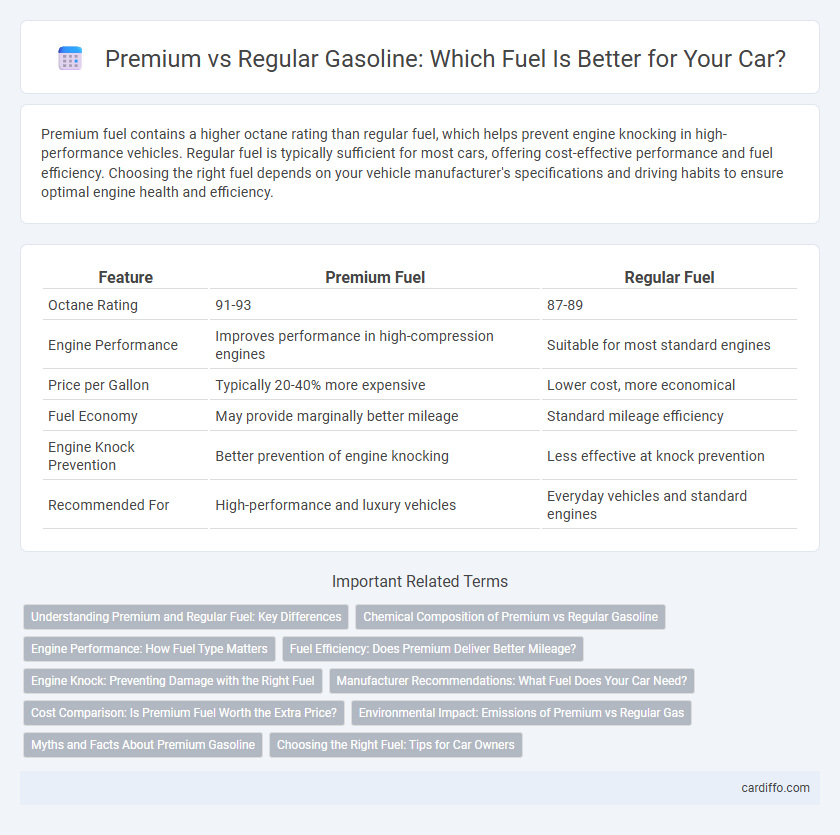Premium fuel contains a higher octane rating than regular fuel, which helps prevent engine knocking in high-performance vehicles. Regular fuel is typically sufficient for most cars, offering cost-effective performance and fuel efficiency. Choosing the right fuel depends on your vehicle manufacturer's specifications and driving habits to ensure optimal engine health and efficiency.
Table of Comparison
| Feature | Premium Fuel | Regular Fuel |
|---|---|---|
| Octane Rating | 91-93 | 87-89 |
| Engine Performance | Improves performance in high-compression engines | Suitable for most standard engines |
| Price per Gallon | Typically 20-40% more expensive | Lower cost, more economical |
| Fuel Economy | May provide marginally better mileage | Standard mileage efficiency |
| Engine Knock Prevention | Better prevention of engine knocking | Less effective at knock prevention |
| Recommended For | High-performance and luxury vehicles | Everyday vehicles and standard engines |
Understanding Premium and Regular Fuel: Key Differences
Premium fuel contains a higher octane rating, typically 91 to 94, compared to regular fuel's 87 octane, which helps prevent engine knocking in high-performance or turbocharged engines. Regular fuel is sufficient for most everyday vehicles designed for lower compression engines, offering adequate performance and cost-efficiency. Choosing the correct fuel based on manufacturer recommendations optimizes engine longevity and fuel efficiency while preventing potential damage from pre-ignition or knocking.
Chemical Composition of Premium vs Regular Gasoline
Premium gasoline contains a higher concentration of octane-enhancing additives and fewer impurities compared to regular gasoline, which typically has a lower octane rating and more hydrocarbons prone to knocking. The enhanced chemical composition of premium fuel improves combustion efficiency and reduces engine deposits, promoting better performance and longevity. Regular gasoline primarily consists of a blend of hydrocarbons with lower octane, leading to increased risk of pre-ignition and less optimized engine operation.
Engine Performance: How Fuel Type Matters
Premium fuel contains higher octane levels, which prevents engine knocking and allows high-performance engines to operate efficiently under increased compression. Regular fuel, with lower octane, may cause knocking and reduce power output in engines designed for premium fuel, impacting acceleration and overall performance. Choosing the correct fuel type optimizes combustion, enhances power delivery, and extends engine longevity.
Fuel Efficiency: Does Premium Deliver Better Mileage?
Premium fuel often contains higher octane ratings, which can enhance combustion efficiency in engines designed for such fuel, potentially resulting in better mileage. However, for most standard engines optimized for regular gasoline, using premium fuel does not significantly improve fuel efficiency or mileage. Vehicle manufacturers typically recommend premium fuel only for high-performance engines, making regular fuel the more cost-effective choice for everyday driving without sacrificing mileage.
Engine Knock: Preventing Damage with the Right Fuel
Premium fuel has a higher octane rating than regular fuel, which helps prevent engine knock by resisting premature combustion in high-compression engines. Using regular fuel in an engine designed for premium can cause knocking, leading to potential damage and reduced performance. Selecting the correct fuel type based on the manufacturer's recommendation ensures optimal engine operation and longevity.
Manufacturer Recommendations: What Fuel Does Your Car Need?
Car manufacturers specify fuel types based on engine design and performance requirements, with premium fuel often recommended for high-compression or turbocharged engines to prevent knocking and optimize efficiency. Regular gasoline suits most standard engines, balancing cost and performance without compromising engine health. Following manufacturer recommendations ensures optimal engine longevity, fuel economy, and emissions compliance.
Cost Comparison: Is Premium Fuel Worth the Extra Price?
Premium fuel typically costs 20-50% more per gallon than regular gasoline, with prices varying regionally and by brand. Most vehicles designed for regular fuel do not experience enough performance or efficiency gains from premium fuel to justify the higher expense. However, high-performance and luxury cars with higher compression engines may benefit from premium fuel's higher octane, potentially improving engine efficiency and preventing knock.
Environmental Impact: Emissions of Premium vs Regular Gas
Premium gasoline often contains higher octane levels and additives designed to improve engine efficiency, which can result in marginally lower emissions compared to regular gasoline. However, the environmental impact difference between premium and regular fuel is minimal when used in engines designed for regular gasoline, as the combustion process and resulting emissions remain largely similar. Choosing premium fuel primarily benefits engine performance rather than significantly reducing carbon dioxide or pollutant emissions.
Myths and Facts About Premium Gasoline
Premium gasoline often carries the myth that it universally improves engine performance and fuel efficiency, yet this is only accurate for vehicles explicitly requiring higher octane fuel to prevent engine knocking. Regular gasoline typically suffices for most cars designed for 87 octane, with premium fuel providing no added benefits and wasting consumer money unless specified by the manufacturer. Scientific studies confirm that using premium fuel in engines intended for regular fuel does not enhance power, mileage, or emissions, debunking misconceptions fueled by marketing rather than mechanical necessity.
Choosing the Right Fuel: Tips for Car Owners
Choosing the right fuel for your vehicle is essential for optimal engine performance and longevity. Premium fuel offers higher octane levels, reducing engine knocking in high-performance or turbocharged engines, while regular fuel is sufficient for most standard cars with lower compression ratios. Always consult the vehicle manufacturer's recommendations to ensure fuel compatibility, balancing cost-efficiency with engine health.
Premium vs Regular Infographic

 cardiffo.com
cardiffo.com